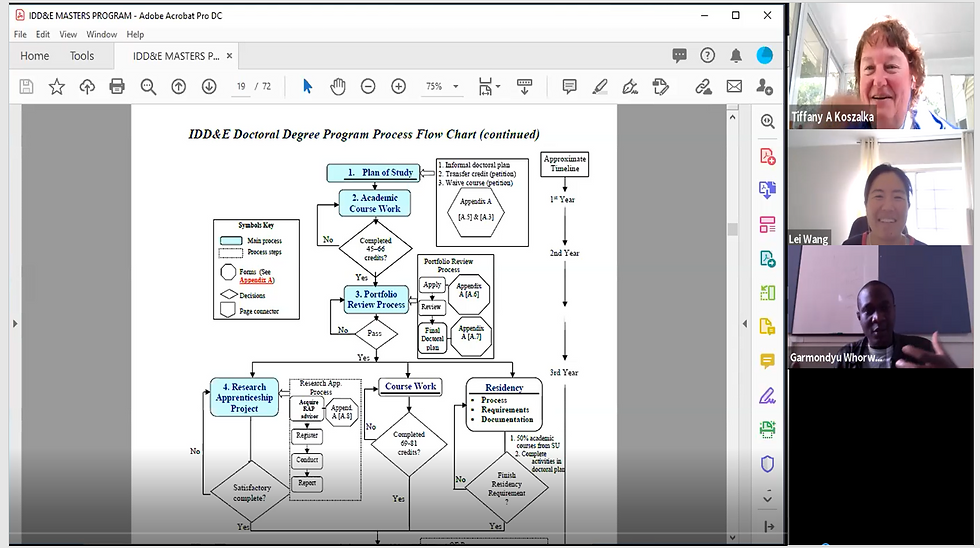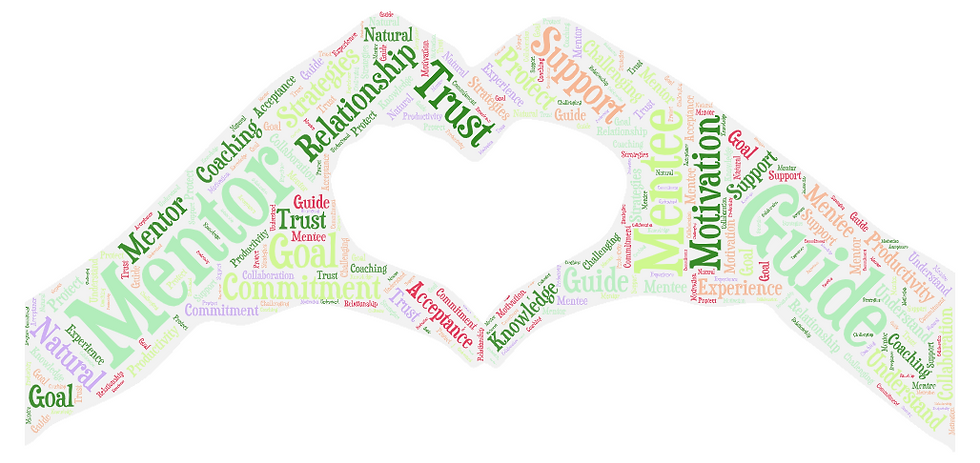My experience of having meetings with my advisor, Dr. Tiffany Koszalka
- lwang698
- Oct 1, 2020
- 4 min read
Updated: Oct 26, 2020
In order to get me to a deeper state of learning with greater depth of knowledge, Dr. Koszalka has used different strategies. These have prompted me to think about how I communicate with students, faculty, and peers, both in synchronous conversations and discussions as well as face-to-face meetings.

I am still ashamed that I failed to attend her first meeting in summer in 2018. I was recommended by the chair of our department to work with Dr. Koszalka to design online courses. That was the first time I worked with her outside of my coursework. I didn't develop the habit of checking email in a timely way, so I missed the first scheduled meeting. I felt so sorry, but she comforted me and we scheduled another meeting.
In the beginning, I was so nervous to have meetings with her. However, after the first meeting, I felt relieved. She gave our design team very specific instructions, just like what we receive in class. After several meetings, I came to appreciate her style of holding meetings with students. I have learned how to apply some of the strategies to my own meetings.
Sending an invitation email with an agenda
I am impressed by the first invitation for different projects and meetings I had with her. She is always polite and asks me the time slots that I can meet her. The first sentence always starts with:" Thank you for..." Then she writes the purpose of the email and how I should prepare for the meetings. Sometimes, if needed, she sends the link for meetings and additional resources along with email.
Creating an interactive and productive environment
For every meeting I had with her, she prepared materials for me to guide me to achieve the goals she set. Sometimes we were centered on an open-ended (occasionally controversial) topic that would prompt us to learn how to argue and develop our critical thinking skills. She prefers to talk about knowledge and information that benefits from listening and questioning. Later she shares the materials for review on my own. This method makes me more comfortable starting to construct my own work.
Prepared to answer questions
Tiffany never gives any impromptu speeches. She normally starts with the review of the last meeting and the process of our projects. Then she reviews the guidelines or outlines of what we are supposed to do. The meeting styles vary. If I am working with teams for reporting, she directly asks us to present and encourages other teams to offer feedback. Finally, she will give me feedback. She is very knowledgeable. In one meeting, I was presenting about self-regulated learning models and said I reviewed all the models. She then interrupted me and challenged me with several questions. I couldn't answer any of those questions. I read the models as what they were, taking them at face value. I didn't understand them or even realize they were not the origin of self-regulated learning. She suggested that I go back to the literature and think about the development of self-regulated learning. She mentioned that the conceptual foundation of SRL microanalytic methodology can be traced back to the 1970s. Can you trust the founder of the theory? Why? What other ways of thinking about the role of self-regulatory processes are there? Have you compared their perspectives, and what are your standpoints? These suggestions corrected my ways of reading books and journal papers. I started to use Microsoft notes to think while reading. Later when I borrowed the handbook of self-regulated learning, I find out that what she said was exactly correct. During the 1960s and 1970s, the initial interest in the role of self-regulatory processes started and there were three groups of studies focusing on different elements of self-regulated learning processes. She set a good example for me to start thinking about what kinds of researcher I should be. It's not all about hard work. In addition to this, I have to develop my abilities as a critical thinker.
Have passion to engage students in the learning process
Tiffany answered any question I asked. She is very patient and amiable. I remember once when we had a meeting, I forgot how to spell "affect," and I asked her immediately in the meeting. She didn't laugh at me but very patiently told me the correct spelling of the word and explained why this word was used in this context. I was moved by her attitude. She dedicates herself to supporting her students. While doing one of the projects, I asked her about a biology scenario, and she taught me for 4 hours. I didn’t realize that until I looked at my watch when the video conferencing ended.
Sending a reflective email for further improvement
At the end of each meeting, she would address how I would do our work or send email for clarification and tell me the deadlines for each part of projects. From the faculty side, it is a lot of work. I assume that she would like to make sure that I can make progress day by day.
She teaches me how to develop professional relationships and practices that I didn't pay enough attention to before and that will make me successful throughout my career.






Comments